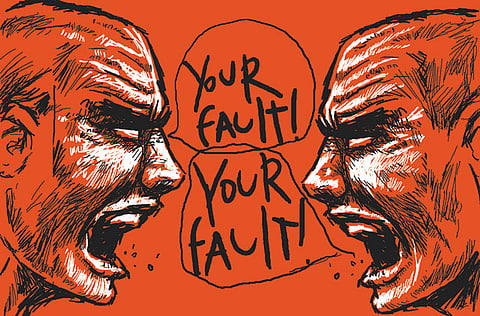Poverty a major worry for Arab world
The recent riots in the region by unemployed youth are a signal for authorities to take urgent action

Redundant Saudi teachers staged a rare protest in Riyadh last week, demanding jobs in a country where official unemployment stands at 10.5 per cent, but where unofficial estimates are probably higher. In Ma'an, Jordan, following the deaths of two workers over a water project, police battled demonstrators with tear gas to quell tribal rivalries. At least 23 civilians were killed in recent clashes with Tunisian law enforcement authorities after Mohammad Bu Azizi set himself on fire in the town of Sidi Bouzid on December 27. Following a 30 per cent price increase since January 1 for basic staples, food riots in Algeria left five people dead, and more than 800 injured. Why are young Arab protesters so angry?
Inasmuch as Saudi Arabia, Jordan, Tunisia and Algeria are not "poor" countries, clashes cannot be explained in classic socioeconomic terms (haves vs. have-nots). One must also wonder what else might be ailing these societies.
Saudi teachers, for example, who could earn up to $2,200 (8,000 Saudi riyals, Dh7,800) a month in government schools, are usually offered about $550 (2,000 riyals) in the private sector. Needless to say that most prefer to settle for state positions even if these are limited in number. Many are forced to engage in double or triple occupations, working as taxi drivers, private security guards or other low-paying jobs to make ends meet. This is not enough to get married and raise a family.
The situation is not any better in Jordan, where jobs are scarce, and tribal clashes the norm. Often, frustrated protesters set fire to cars and government buildings, not only because some of the rioters blame Amman for failing to arrest and prosecute those responsible for occasional killings, but also because official complacency tends to spill over with relative ease. Unemployment literally means that a growing pool of able bodied young men are idle, which is a sufficient ingredient for recruiters eager to fill extremist ranks, and which can be easily updated after every skirmish.
Regrettably, nowhere is this more visible than in Tunisia where the government denied what was splashed over the internet for weeks on end. It finally acknowledged a few days ago that citizens — and it is important to underline the fact that these folks were not space aliens — were killed in the towns of Thala, Rgeb, and Kasserine, as well as the capital city of Tunis. While authorities may have fired in self-defence against rioters armed with gasoline bombs, sticks and stones, the disproportionate use of force was evident. In the event, police units "opened fire" and "killed" their own citizens, which begs the question: although the state has a legal right to use force to maintain order, what happens to its legitimacy when it guns down its own people?
Tunisian protesters' grievances erupted after Tunis offered to fund a programme that would provide 50,000 unemployed graduates guaranteed employment. This was not enough. On Monday, President Zine Al Abidine Bin Ali stepped up to the place, and promised to create 300,000 new jobs between 2011 and 2012. Against an unrelenting backdrop of protests and clashes that now involves college and high-school students, the acknowledgement was astounding, with the head of state recognising that Tunisia's relatively successful economic boom did not trickle down.
Oblivious elite
Nowhere was this more visible than in Algeria, where an oblivious elite seems to run the country as if it was its private property, while shocking unemployment rates (officially near 30 per cent but probably higher) condemn young people to destitution. Lest one overlook this fact, Algeria is a relatively wealthy country, although one can only speculate where the oil income goes.
Today, more than 75 per cent of the Algerian population is under 30 years of age, which adds to growing family burdens. Prices for essential food items such as flour, cooking oil and sugar doubled during the past two weeks, which meant that Abdul Aziz Bouteflika's decisions to slash taxes on imports skirted the issue. One hoped that Algiers would recognise that employment, government services, and affordable housing were what needed to be addressed if many more are not to embark on dangerous crossings of the Mediterranean to reach European shores.
Speaking at the "What is the Alternative Development Model in the Arab region?" forum last Thursday in Beirut, former Lebanese Finance Minister Georges Corm identified the most serious challenge facing development in Arab countries: youth emigration. According to the erudite economist, this phenomenon resulted in a $1.6 billion (Dh5.88 billion) yearly loss for the Arab world, through a massive ‘Brain Drain'. Among other reasons, this intellectual flight was due to unsophisticated economic laws, corruption, illiteracy (60 million Arab women still cannot read), cronyism, high poverty rates in rural areas, lack of innovation, in addition to the concentration of wealth in the hands of a limited group.
When Arab youths cannot emigrate, and not all wish to leave their homelands to live in exile, some will die to end poverty. We know that the Arab World must create over 100 million new jobs during the next 15-20 years to meet the needs of young people entering various job markets. Absent such results, one should not be surprised that riots fill our streets, and genuine instability becomes a dangerous pattern.
Dr Joseph A. Kechichian is a commentator and author of several books on Gulf affairs.


